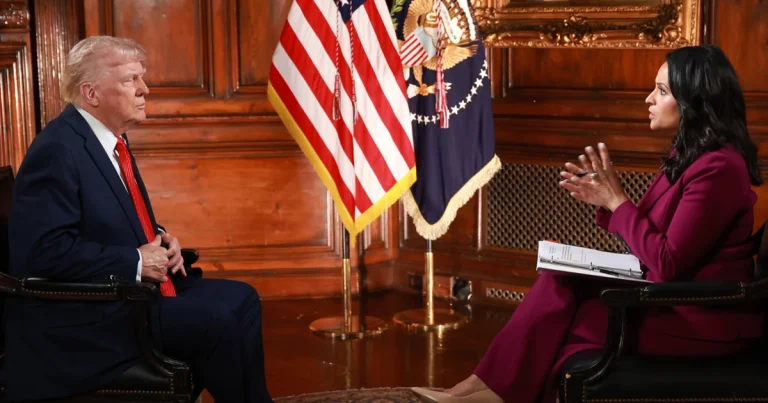Trump Downplays Recession Fears, Says U.S. Economy Will Be “OK” in the Long Run
President Donald Trump on Friday dismissed growing concerns about a potential recession, insisting the U.S. economy would be “OK” in the long term—even if it experiences a short-term downturn.
In an interview with Meet the Press moderator Kristen Welker, Trump was asked twice whether it would be acceptable for the country to go through a recession now if it meant long-term stability. “Look, yeah, it’s—everything’s OK,” Trump said. “What we are—I said, this is a transition period. I think we’re going to do fantastically.”
When pressed further on whether he feared a recession, Trump responded with a simple, “No.” Asked if he thought one might happen, he replied, “Anything can happen, but I think we’re going to have the greatest economy in the history of our country.”
His comments come amid mounting concern on Wall Street, where analysts have cited Trump’s shifting tariff policies as a key factor that could trigger a downturn. But Trump dismissed such concerns, pointing to optimistic voices in the financial sector. “Well, you know, you say, ‘Some people on Wall Street say’—well, I tell you something else. Some people on Wall Street say that we’re going to have the greatest economy in history. Why don’t you talk about them?” he said during the interview at his Mar-a-Lago resort in Florida.
“There are many people on Wall Street who say this is going to be the greatest windfall ever,” he added.
According to preliminary figures released by the Commerce Department on Wednesday, the U.S. economy contracted by 0.3% in the first quarter of 2025. The decline was largely attributed to a drop in exports and a surge in imports, ahead of anticipated tariffs from the Trump administration.
In a Cabinet meeting that same day, Trump deflected responsibility for the weak economic numbers, blaming the policies of former President Joe Biden. “You probably saw some numbers today,” he told reporters. “And I have to start off by saying, that’s Biden. That’s not Trump. Because we came in on January, these are quarterly numbers, and we came in and I was very against everything that Biden was doing in terms of the economy, destroying our country in so many ways.”
Since taking office in January, Trump has moved aggressively to reshape U.S. trade relationships, reimposing tariffs on major partners like Canada, Mexico, and China.
Last month, he temporarily paused the rollout of broader tariffs for 90 days, just days after initially enacting them. That move triggered a market rebound, reversing the losses that followed his April 2 tariff announcement.
Despite this partial pullback, Trump has escalated tariffs on Chinese imports, raising the rate to 145%. Still, he downplayed fears that the tariffs would significantly affect consumer prices or product availability.
“Somebody said, ‘Oh, the shelves are going to be open,’” Trump said during the Cabinet meeting. “Well, maybe the children will have two dolls instead of 30 dolls, you know? And maybe the two dolls will cost a couple of bucks more than they would normally.”

